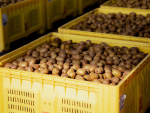Zespri is taking action to protect and control its intellectual property, says Zespri chief operating officer Simon Limmer.
New Zealand Police are investigating a complaint of a breach of Zespri’s plant variety rights to Gold3 (Zespri SunGold) and Gold9 (Zespri Charm).
This involves plant material transferred to a third party contrary to the terms of Zespri’s licence, possibly relating to the fraudulent sale of licence rights.
Zespri suspects that several years ago plant material was taken to China and planted there on a relatively small scale. As this breach could give rise to criminal issues in NZ, Zespri has passed on the information it holds to the police and understands they are investigating.
Gold9 and Gold3 are subject to plant variety rights owned by Zespri in NZ and other jurisdictions.
Licences are granted by Zespri to growers on a country-by-country basis.
These can only be transferred within the same country subject to the rules of each licence.
The purported sale of a licence from one jurisdiction to another by a third party is a breach of Zespri’s licence and plant variety rights and could give rise to allegations of fraud or misleading conduct.
Zespri started investigating after receiving local information about possible plantings in April last year.
The kiwifruit marketer says it immediately started an extensive due diligence process and confirmed those reports late last year, which led to the present investigation by NZ authorities.
“We are seeking action to protect our plant variety rights in NZ and deter any future breaches,” Limmer explains.
“Zespri’s plant variety rights are important intellectual property, developed by extensive investment over many years.”



















